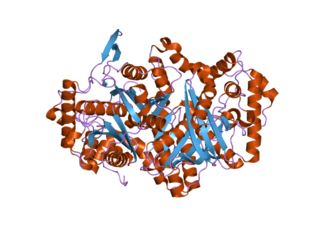Related Research Articles

Trifunctional enzyme subunit alpha, mitochondrial also known as hydroxyacyl-CoA dehydrogenase/3-ketoacyl-CoA thiolase/enoyl-CoA hydratase, alpha subunit is a protein that in humans is encoded by the HADHA gene. Mutations in HADHA have been associated with trifunctional protein deficiency or long-chain 3-hydroxyacyl-coenzyme A dehydrogenase deficiency.

Trifunctional enzyme subunit beta, mitochondrial (TP-beta) also known as 3-ketoacyl-CoA thiolase, acetyl-CoA acyltransferase, or beta-ketothiolase is an enzyme that in humans is encoded by the HADHB gene.

Acetoacetyl CoA is the precursor of HMG-CoA in the mevalonate pathway, which is essential for cholesterol biosynthesis. It also takes a similar role in the ketone bodies synthesis (ketogenesis) pathway of the liver. In the ketone bodies digestion pathway, it is no longer associated with having HMG-CoA as a product or as a reactant.

Thiolases, also known as acetyl-coenzyme A acetyltransferases (ACAT), are enzymes which convert two units of acetyl-CoA to acetoacetyl CoA in the mevalonate pathway.

Acetyl-CoA acetyltransferase, mitochondrial, also known as acetoacetyl-CoA thiolase, is an enzyme that in humans is encoded by the ACAT1 gene.

In enzymology, a 3-hydroxyacyl-CoA dehydrogenase (EC 1.1.1.35) is an enzyme that catalyzes the chemical reaction

Non-specific lipid-transfer protein also known as sterol carrier protein 2 (SCP-2) or propanoyl-CoA C-acyltransferase is a protein that in humans is encoded by the SCP2 gene.

In enzymology, a 3-oxoacid CoA-transferase is an enzyme that catalyzes the chemical reaction
In enzymology, an acetate CoA-transferase is an enzyme that catalyzes the chemical reaction

In enzymology, a pantetheine hydrolase (EC 3.5.1.92) is an enzyme that catalyzes the chemical reaction

Butyryl-CoA is an organic coenzyme A-containing derivative of butyric acid. It is a natural product found in many biological pathways, such as fatty acid metabolism, fermentation, and 4-aminobutanoate (GABA) degradation. It mostly participates as an intermediate, a precursor to and converted from crotonyl-CoA. This interconversion is mediated by butyryl-CoA dehydrogenase.
In enzymology, a 3-oxoadipyl-CoA thiolase is an enzyme that catalyzes the chemical reaction

In enzymology, an acetyl-CoA C-acetyltransferase is an enzyme that catalyzes the chemical reaction
In enzymology, a propionyl-CoA C2-trimethyltridecanoyltransferase is an enzyme that catalyzes the chemical reaction
In enzymology, a dephospho-[reductase kinase] kinase is an enzyme that catalyzes the chemical reaction

Acetyl-CoA acetyltransferase, cytosolic, also known as cytosolic acetoacetyl-CoA thiolase, is an enzyme that in humans is encoded by the ACAT2 gene

3-Ketoacyl-CoA thiolase, peroxisomal also known as acetyl-Coenzyme A acyltransferase 1 is an enzyme that in humans is encoded by the ACAA1 gene.
Very-long-chain 3-oxoacyl-CoA reductase (EC 1.1.1.330, very-long-chain 3-ketoacyl-CoA reductase, very-long-chain beta-ketoacyl-CoA reductase, KCR (gene), IFA38 (gene)) is an enzyme with systematic name (3R)-3-hydroxyacyl-CoA:NADP+ oxidoreductase. This enzyme catalyses the following chemical reaction
Acetoacetyl-CoA synthase (EC 2.3.1.194, NphT7) is an enzyme with systematic name acetyl-CoA:malonyl-CoA C-acetyltransferase (decarboxylating). This enzyme catalyses the following chemical reaction
Very-long-chain 3-oxoacyl-CoA synthase (EC 2.3.1.199, very-long-chain 3-ketoacyl-CoA synthase, very-long-chain beta-ketoacyl-CoA synthase, condensing enzyme, CUT1, CER6, FAE1, KCS, ELO) is an enzyme with systematic name malonyl-CoA:very-long-chain acyl-CoA malonyltransferase (decarboxylating and thioester-hydrolysing). This enzyme catalyses the following chemical reaction
References
- ↑ Middleton, B. (1973). "The oxoacyl-coenzyme A thiolases of animal tissues". Biochem. J. 132 (4): 717–730. doi:10.1042/bj1320717. PMC 1177647 . PMID 4721607.